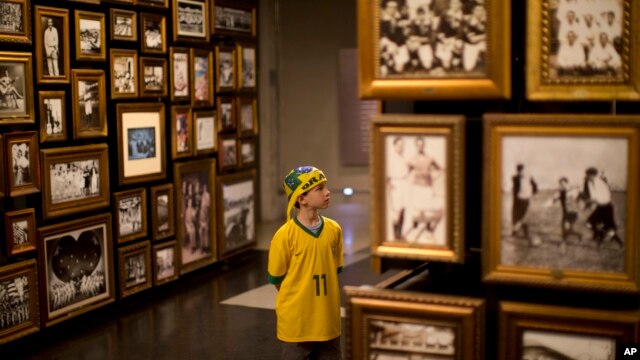http://bbs.wenxuecity.com/mysj/191604.html

In this June 12, 2014 photo, a young Brazil soccer fan visits the Hall of Origins at the Soccer Museum in Sao Paulo, Brazil.
體育:Brazil Football Museum Attracts Passionate Fans(音頻)ZT
http://av.voanews.com/clips/LERE/2014/07/07/f95a8f1e-214a-4e7b-9aed-b266263dbc94.mp3?download=1
http://learningenglish.voanews.com/content/brasil-football-museum-attracts-passionate-fans/1952234.html
The excitement of the 2014 World Cup has spread all over the world. Tens of thousands of people have travelled to Brazil to support their favorite teams. Some of them are also visiting a football-related museum, in the city of São Paulo, near the Pacaembu sports center.
The museum is designed to interest lovers of the World Cup, world history and Brazilian culture. It tells about more than 100 years of football history. After seeing the museum, it is easy to understand why Brazilians love the game of football -- which people in the United States call “soccer.”
People entering the museum see and hear a video of Brazilian football legend and three-time World Cup Champion Pelé welcoming them in three different languages.
About 1,000 people a day visit the museum. But during the World Cup, it has two times as many visitors.
Visitors hear the sounds of goals and whistles, and experience what it is like to win and lose. There is a “Hall of Heroes” that shows some of Brazil’s most famous football players. The museum also has computer games that let visitors play football without going onto the pitch, or field.
Daniela Alfonsi is the content director of the museum.
“We have 15 rooms in long-term exhibition that work with the motion, that work with experiences, so in each room you can feel the voice of the supporters in the bleachers, you can hear the radio narrations, you can see football as art more than as a sport.”
Pelé once called football “o jogo bonito” or “the beautiful game.” In this museum, it is easy to see why.
Carlos Acosta is a Colombian who lives in São Paulo, and loves football.
He says Brazilians think and talk about football all day. They eat it, they drink it, they breathe it, he says.
One room at the museum is very special to Brazilians. It tells about the defeat of the Brazilian team by Uruguay in the 1950 World Cup final at the Maracana sports center in Rio de Janeiro. The score was 2 to 1. Brazilians call the defeat “The Maracanazo.” The loss happened as more than 90,000 people watched.
But the sadness felt from the loss did not last long. Brazil has won five World Cup championships -- the most of any country.
I’m Jonathan Evans.